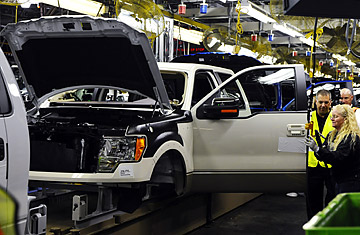
Employees work on the assembly line of the F-150 pickup at a plant in Kansas City, Mo.
The United Auto Workers (UAW) took a major step toward fulfilling the terms of the federal loans doled out to automakers this winter. The union said Monday that it has reached a tentative agreement with Ford to accept some equity instead of cash to finance the special trust for retiree health care, known as the Voluntary Employees Beneficiary Association, or VEBA. (Read "UAW agrees to Concessions With Automakers")
The UAW's agreement with Ford does not automatically resolve the ongoing negotiations that labor is having with the managements of GM and Chrysler, but it does establish a prototype that could be used, and it signals the UAW's new willingness to compromise on this issue. "The modifications will protect jobs for UAW members by ensuring the long-term viability of the company," said UAW President Ron Gettelfinger.
Joe Hinrichs, group vice president of Global Manufacturing and Labor Affairs at Ford Motor Company, said the tentative agreement gives Ford "the option" of using Ford common stock for up to 50% of the payments into the VEBA in lieu of cash. "We will consider each payment when it is due and use our discretion in determining whether cash or stock makes sense at the time, balancing our liquidity needs and preserving shareholder value," Hinrichs said.
The UAW plans to offer similar terms to both General Motors and Chrysler LLC, sources indicated. Officials from both companies, which together asked for more than $21.6 billion in loans last week, declined to comment on the Ford deal. Both companies are supposed to have deals with the union wrapped up by March 31.
While Ford has not asked for government aid, it has used the deep recession in the industry to seek concessions from the union. Retiree and active-employee health-care benefits cost Ford about $2.2 billion annually, according to company officials.
For its part, the UAW has obliged in an effort to blunt demands for even greater concessions from General Motors Corp. and Chrysler LLC, which have accepted government loans. Traditionally, the UAW has had better relations with Ford than with GM or Chrysler.
Under term loan agreements that GM and Chrysler signed with the U.S. Treasury in December, the UAW is required to accept equity instead of cash as payments into the health-care trust. But only last month, Gettelfinger said he was reluctant to accept any equity because it could jeopardize the health-care benefits of retirees. Gettelfinger also noted at the time that the UAW had not signed any commitment to a new VEBA funding scheme as part of the government loan deal.
The changes agreed to with Ford are now subject to approval of the UAW membership at Ford. Such a vote, which could also cover other agreed to cuts, such as elimination of productivity bonuses and cost-of-living adjustments over the next two years, could be held as early as next week. In addition, proposed changes to the VEBA will require court approval, Gettelfinger said.
